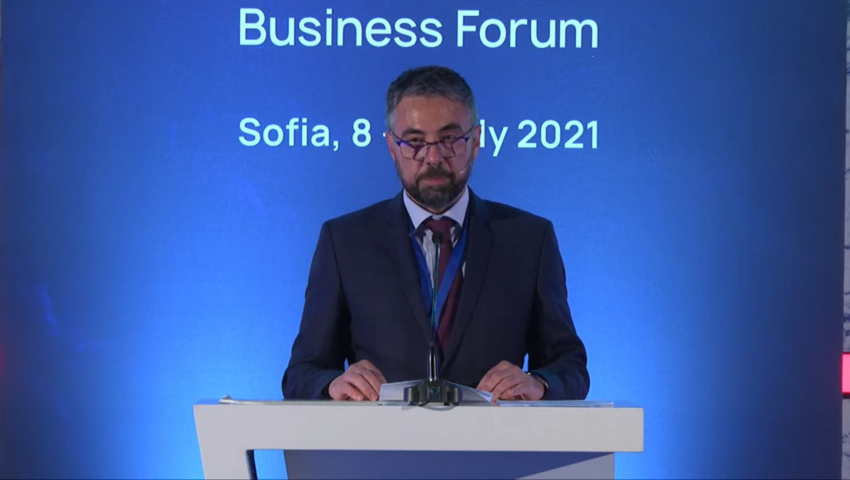Minister Zhivkov: Carbon-free economy means maximum increase of energy efficiency, development of renewable energy sources, nuclear energy and natural gas

Over 75% of carbon emissions in the European Union are the result of energy production and consumption. That is why the energy sector is expected to play a key role in the transition to a carbon-free economy, transforming itself into a cleaner, more secure, competitive and accessible one. This was said by the Minister of Energy Andrey Zhivkov at the opening of the panel "Energy" of the Business Forum, organized within the Bulgarian household of the initiative "Three Seas".
Minister Zhivkov outlined the new challenges facing the industry. The Green Deal is the basis for planning the EU's long-term development towards a zero-emission economy by 2050 with the intermediate goal of reducing greenhouse gas emissions by at least 55% by 2030. The Union's ambitious climate policy sets serious tasks for the countries of Central and Eastern Europe, which would be difficult to overcome without joint efforts, he said, emphasizing that the initiative of the 12 participating countries has a regional character and can be realized only through joint decisions and actions. According to him, the established tradition of holding business forums within the "Three Seas" demonstrates the transformation of the initiative from a predominantly political to an active economic platform with the presence of significant companies in the energy sector.
The main task of the governments in the region is to create an attractive investment and business climate based on the principles of the free market, transparency and competitiveness, said Minister Zhivkov. Among the priorities for this task, he outlined the need to improve infrastructure connections, including in the energy sector, as a condition for deepening economic partnership. The synergy in the development of different types of infrastructure has long-term effects such as the creation of new supply chains and new jobs, as well as closer integration of our economies and societies, said Minister Zhivkov.
Energy cooperation in the region can be a model for other areas as well. A good example of this is the development of gas infrastructure, including the construction of interconnections and liquefied gas terminals, through which the countries of Southeast Europe have access to various sources and routes for the supply of natural gas. The Three Seas Initiative has the potential to play an important role in this process by complementing European instruments for regional cooperation and improving energy connectivity, the energy minister stressed.
According to him, the ideal reliable and carbon-free energy system of the future includes renewable energy sources, base capacities and energy storage facilities. The still limited progress in the development of energy storage systems calls for a more flexible approach to the definition of the energy mix in the medium term. The realistic path to a sustainable carbon-free economy includes maximizing energy efficiency, developing renewables and nuclear energy as baseline, and using natural gas as a transition fuel and balancing fuel. For the purpose of wider introduction of safe and low-carbon hydrogen, it will be necessary to build a new and adapt the existing gas infrastructure, he stressed.
Achieving the European climate goals requires adequate support from European mechanisms and access to financial instruments for the transition. The Three Seas Investment Fund, which is the economic dimension of the initiative and a financial mechanism for the implementation of energy projects in the region, is an instrument that successfully complements these European mechanisms, concluded the Bulgarian Minister of Energy.
